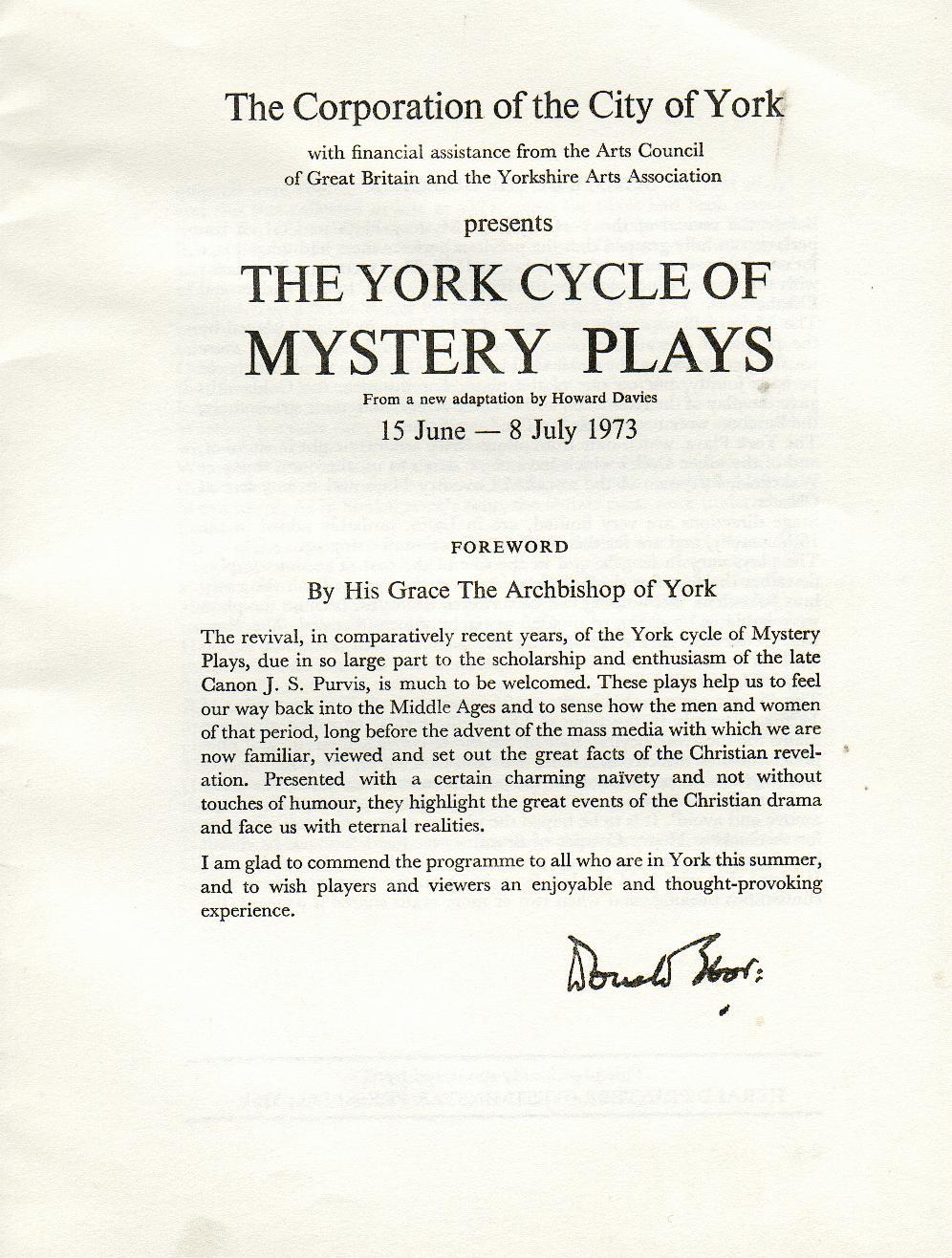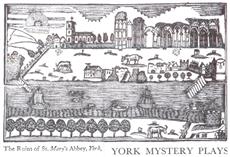Search the NCEM archive
Item details
Programmes/Posters : 1973 Programme
Item type: Programmes/PostersArchive reference: YMP/B/8
Date/year: 1973
Description:
For the full cast see the page entitled Progamme of 1973 play.
Below is the introductory page of the 1973 programme, signed by Rev. Donald Coggan, Archbishop of York. 1973 appears to be the first time that the Plays departed from Canon Purvis' script - see below.

All the post-1951 programmes up to and including 1969 refer to Canon Purvis' script as their source (based on manuscript Add. MS 35290). But in 1973 the programme specifically states that Howard Davies has done a new edition.
His note on the adaptation:"Much of the original language - late Middle English of the Northern dialect - is still comprehensible in its own right. This therefore stands. Such language as is inscrutable has been turned only into other words already current by the mid-16th century, the period at which these plays were last performed. Later language would be as obtrusive as new colours in an old canvas, and the Devil and his followers must be left to swear by Mahound (Mahomet) for the sake of the period as well as the metre. The original is written in verse varying from simple rhymed quatrains to complex alliterative stanzas; the simpler verse aptly suiting unaffected matter, and the ornate style those scenes wanting dignity, magniloquence or bombast. The alliteration: I am dame Precious Percula, of Princes the Prize, or I am Gracious and Great, God without beGinning - will escape no ear. The rhyming, often intricate, may catch it also and be found agreeable. For these are both the frame and flourish of this drama, splendid dramatic devices lending themselves to open speech, and creating a pattern of sonority that carries in its wake an effect even greater than its individual meaning. The language is itself dramatic.
In the choice of scenes, there is some diversion, including anew the scene of the Last Supper, which together with several other scenes, lacks portions in the original manuscript, that have been supplied here, in a manner which I hope need be an embarrassment only to myself. Veronica has been re-instated in name, after the York Town Clerk's play-list of 1415, whose lines had afterwards been given elsewhere. And a moment from the Wakefield cycle has been interpolated to bring Mary Magdalene happily to the disciples at the Resurrection, on the assumption that the borrowing of a line or two can cause no offence to a town who borrowed five of York's plays whole.
The original Plays are the creation of a number of hands; they were in their own day revised and re-written, and there is no telling what manner of alteration they might have received in performance. One's work therefore is not without precedents. But it has its traditions; and within that tradition, it was customary for the individual hand to be submerged for the sake of the common pattern; their authors remain anonymous. That one's handiwork should remain so also, is the most to be desired. D.H.D." Programme note:
"Howard Davies was educated at the King's School, Chester, and afterwards at Queen's College Cambridge. He has translated the plays direct from the medieval manuscript kept in the British Museum and took part in the 1969 production of the Mystery Plays (a Three King). He has also translated the Wakefield and Coventry Cycles for performance in the City of London Festival in 1971 and 1972. Apart from the translation work, Mr Davies is also a Publisher's Editor."
The cover design of the Mystery Play programme was by Stewart Lack, art teacher at Archbishop Holgate's School.

< Go back